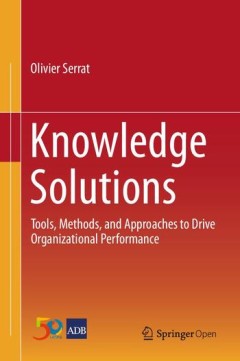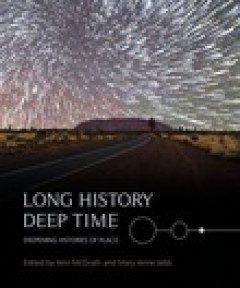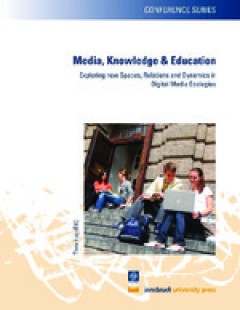Filter by

Fading foundations : probability and the regress problem
This book addresses the age-old problem of infinite regresses in epistemology. How can we ever come to know something if knowing requires having good reasons, and reasons can only be good if they are backed by good reasons in turn? The problem has puzzled philosophers ever since antiquity, giving rise to what is often called Agrippa's Trilemma. The current volume approaches the old problem in a…
- Edition
- -
- ISBN/ISSN
- 9783319582955
- Collation
- xi, 238p. : ill.
- Series Title
- -
- Call Number
- 121 ATK f

Knowledge solutions : tools, methods, approaches to drive development forward…
This book comprehensively covers topics in knowledge management and competence in strategy development, management techniques, collaboration mechanisms, knowledge sharing and learning, as well as knowledge capture and storage. Presented in accessible “chunks,” it includes more than 120 topics that are essential to high-performance organizations. The extensive use of quotes by respected expe…
- Edition
- -
- ISBN/ISSN
- 9789811009839
- Collation
- xvi, 1140p. : ill.
- Series Title
- -
- Call Number
- 658.4038 SER k

Knowledge and action
This book is open access under a CC BY 4.0 license. This volume explores interdependencies between knowledge, action, and space from different interdisciplinary perspectives. Some of the contributors discuss knowledge as a social construct based on collective action, while others look at knowledge as an individual capacity for action. The chapters contain theoretical frameworks as well as exper…
- Edition
- -
- ISBN/ISSN
- 9783319445885
- Collation
- x, 300p. : ill.
- Series Title
- -
- Call Number
- 306.42 KNO k

Long history, deep time. Deepening histories of place
The vast shape-shifting continent of Australia enables us to take a long view of history. We consider ways to cross the great divide between the deep past and the present. Australia’s human past is not a short past, so we need to enlarge the scale and scope of history beyond 1788. In ways not so distant, these deeper times happened in the same places where we walk today. Yet, they were not th…
- Edition
- -
- ISBN/ISSN
- 9781925022520
- Collation
- 241 p.; 22 cm.
- Series Title
- -
- Call Number
- 994.0049915 LON l

Fallibility at work : rethinking excellence and error in organizations
This book addresses how organizations can deal with human fallibility in order to create space for excellence at work. Some mistakes in work settings put lives at risk, while others create openings for innovative breakthroughs. In order to deal constructively with fallibility, an organization needs a communication climate where it is normal to voice opinions, admit mistakes, and ask for help in…
- Edition
- -
- ISBN/ISSN
- 9783319633183
- Collation
- xx, 160p. : ill.
- Series Title
- -
- Call Number
- 658.4038 KVA f

Evaluating evidence of mechanisms in medicine : principles and procedures
This book is the first to develop explicit methods for evaluating evidence of mechanisms in the field of medicine. It explains why it can be important to make this evidence explicit, and describes how to take such evidence into account in the evidence appraisal process. In addition, it develops procedures for seeking evidence of mechanisms, for evaluating evidence of mechanisms, and for combini…
- Edition
- -
- ISBN/ISSN
- 9783319946108
- Collation
- xviii, 125p. : ill.
- Series Title
- -
- Call Number
- 610.1 EVA e

Physical (A)Causality : determinism, randomness and uncaused events
This book addresses the physical phenomenon of events that seem to occur spontaneously and without any known cause. These are to be contrasted with events that happen in a (pre-)determined, predictable, lawful, and causal way. All our knowledge is based on self-reflexive theorizing, as well as on operational means of empirical perception. Some of the questions that arise are the following: a…
- Edition
- -
- ISBN/ISSN
- 9783319708157
- Collation
- xiv, 219p. : ill.
- Series Title
- -
- Call Number
- 530.01 SVO p

Word knowledge and word usage
Word storage and processing define a multi-factorial domain of scientific inquiry whose thorough investigation goes well beyond the boundaries of traditional disciplinary taxonomies, to require synergic integration of a wide range of methods, techniques and empirical and experimental findings. The present book intends to approach a few central issues concerning the organization, structure and f…
- Edition
- -
- ISBN/ISSN
- 9783110440577
- Collation
- IX< 717 p.
- Series Title
- -
- Call Number
- 121 WOR w

Media, knowledge & education : exploring new spaces, relations and dynamics i…
In recent years, new and established media have penetrated, challenged, and often surpassed in significance traditional institutions of socialization and education. Moreover, the social organization of knowledge production and distribution has become highly mediated through increasingly complex combinations of information and communication technologies. The papers in this volume are exploring i…
- Edition
- -
- ISBN/ISSN
- 9783902571670
- Collation
- 319 p.
- Series Title
- -
- Call Number
- 025.5 HUG m

Access to knowledge in the age of intellectual property
A movement emerges to challenge the tightening of intellectual property law around the world.At the end of the twentieth century, intellectual property rights collided with everyday life. Expansive copyright laws and digital rights management technologies sought to shut down new forms of copying and remixing made possible by the Internet. International laws expanding patent rights threatened th…
- Edition
- -
- ISBN/ISSN
- 9781890951979
- Collation
- 649 p.
- Series Title
- -
- Call Number
- 346.048 KRI a
 Computer Science, Information & General Works
Computer Science, Information & General Works  Philosophy & Psychology
Philosophy & Psychology  Religion
Religion  Social Sciences
Social Sciences  Language
Language  Pure Science
Pure Science  Applied Sciences
Applied Sciences  Art & Recreation
Art & Recreation  Literature
Literature  History & Geography
History & Geography